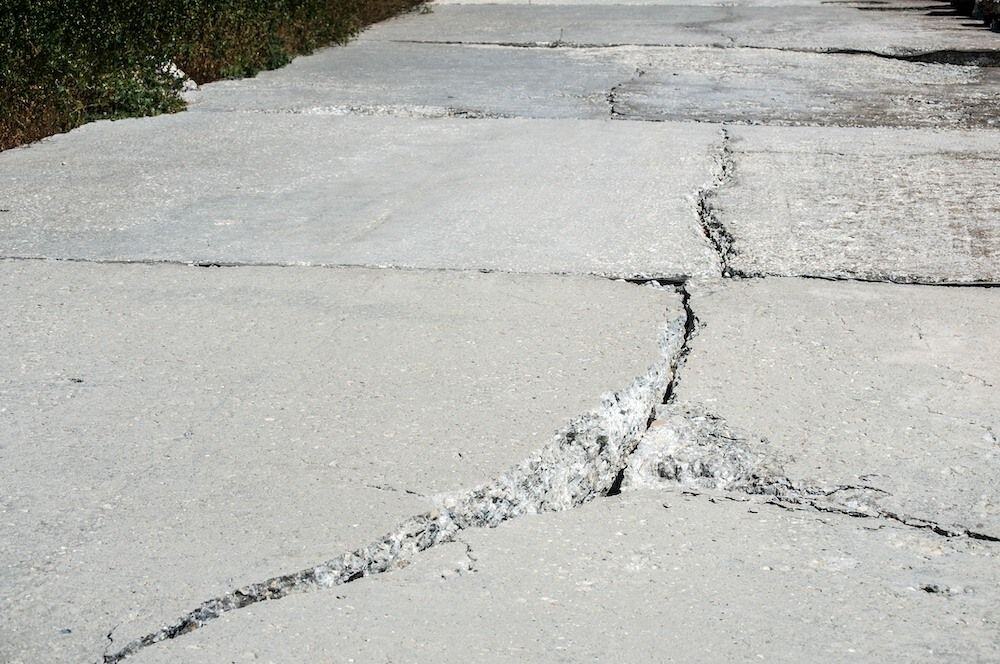
Learn what you can do to prevent concrete cracks on both existing and new concrete slabs.
Concrete is a widely used material for both residential and commercial construction due to its strength and versatility. However, the unfortunate truth is that it’s bound to crack eventually.
However, while you can never completely prevent cracked concrete, there are some things you can do to help extend the life of your concrete and try to prevent as many cracks as possible.
Here at A-1 Concrete Leveling, we’ve been repairing settled and cracked concrete for 30+ years, and we know how frustrating it can be to deal with concrete cracks – especially when your concrete is brand new!
This guide will walk you through some things you can do to help prevent your concrete from cracking, whether it’s with the concrete you already have or the new concrete you’re looking to pour.
Maintain Existing Slabs
-
Seal the Concrete Surface
Using a high-quality penetrating sealer on your concrete will create a barrier against water, salts, stains, etc. This water barrier helps prevent water from being absorbed into the concrete’s pores, which causes cracking during freeze-thaw cycles.
-
Caulk Any Small Gaps or Cracks ASAP
By caulking and sealing up any existing cracks as soon as possible after noticing them, you help prevent them from growing and spreading throughout the slab.
-
Fill Voids
Soil settling or water erosion can lead to voids opening up under concrete slabs, leaving a section of the slab unsupported. This can cause the concrete slab to crack over time. Voids can be filled with stone slurry grout, foam, or mudjacking to reestablish support to the slab.
-
Avoid Heavy Equipment on Concrete
Big, heavy equipment like dumpsters, large trucks, or tree removal machines can crack or crush the concrete.
Mix New Concrete Correctly
-
Correct Proportioning
Ensure that the concrete mix has the right ratio of cement, water, and aggregates. Over-watering the mix can weaken the concrete, while too little water can prevent it from curing properly.
-
Thorough Mixing
Use a cement mixer or mix thoroughly by hand to ensure all components are evenly distributed.
-
Start With a High-Quality Concrete
Lower-quality concrete that doesn’t have the proper ratio of materials won’t stand up well to freeze-thaw cycles, erosion, and UV damage. Because of this, poor-quality concrete will be more likely to crack than a higher-quality alternative.
Use Optimal Curing Techniques
-
Keeping Concrete Moist
Prevent the concrete from drying out too quickly after pouring by covering it with a plastic sheet or by regularly misting it with water. This helps in achieving a stronger, more crack-resistant surface.
-
Controlled Curing Environment
Maintain a stable temperature and humidity level during the curing process to avoid thermal expansion and contraction, which can lead to cracks.
Keep Site Conditions in Mind
-
Compact Submaterials
Ensure the site is thoroughly prepared by assessing and compacting the soil beneath. Poor soil compaction can cause uneven settling, which often results in cracking.
-
Weather Considerations
Avoid pouring concrete in extreme weather conditions. High temperatures can cause rapid evaporation and cold temperatures can freeze water in the mix, both leading to potential cracking.
-
Don’t Pour Near Trees
As tree roots grow, they will likely push up on your concrete slabs. This will not only cause trip hazards but can also cause your slab to break and crack.
Use Reinforcement and Proper Joints
-
Using Reinforcing Materials
Incorporate materials like steel rebar, wire mesh, or fiberglass in your concrete pour. These materials help distribute loads and reduce the tension that can cause cracking.
-
Strategic Joint Placement
Design and incorporate control and expansion joints in the concrete slabs. These are pre-planned cracks or gaps that allow concrete to expand and contract, thereby managing where cracks occur.

Preventing Concrete Cracks FAQ
Can you seal concrete cracks to prevent further cracking?
Caulking any new cracks as soon as you notice them will help prevent the crack from growing and spreading. This is because the caulk creates a seal to keep moisture from entering the crack and expanding when the temperature drops below freezing, which is what causes the cracks to grow and widen over time.
Caulking cracks and gaps also helps prevent water from flowing under the slab, which can cause erosion and eventually lead to the slab settling.
What can I put in my concrete to keep it from cracking?
Most concrete additives are used to help keep all of the things mentioned above under control. Accelerators help concrete set up faster on colder days, retarders help slow down the curing process on hotter days, and plasticizers make it more workable without adding excess water.
At the end of the day, nothing will truly prevent cracks from happening. It’s more about managing where and how they occur with joints to keep the concrete looking good and provide for easy maintenance over time.
Preventing Your Concrete From Cracking
While there is never a guarantee that your concrete won’t crack, doing the things listed above can help keep cracking at bay for existing and new slabs.
For existing concrete, filling voids under the slab, sealing the surface, and caulking any gaps or new cracks are essential to keeping your concrete safe and looking good.
A-1 Concrete Leveling can help with these maintenance practices and more – just find your nearest location and request a free estimate!
Sarah Etler joined A-1 Concrete Leveling after receiving her Bachelor of Arts degree in English from Northern Kentucky University. As A-1's Content Marketing Manager, she works closely with industry experts to produce content that will best answer questions related to concrete repair and maintenance practices. Sarah loves living a life full of discovery and is excited every day to see what new things she can learn and share with those around her.
Topics: